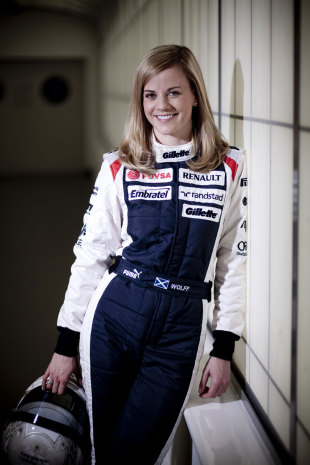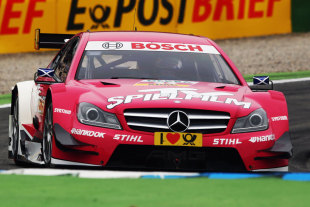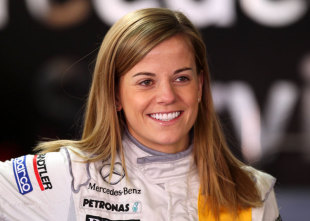
The past few months have seen a raft of changes for racing driver Susie Wolff. At the beginning of the 2012 season, the newly-married Scottish racing driver was announced as a development driver for the Williams F1 team.
The announcement was met with some cynicism in the press, thanks to Wolff's family connections - her husband, Toto, is an investor in the team - and the amount of attention a team gets when a woman wears a race suit. But five minutes spent talking to the DTM racer makes it perfectly clear this development role is no sinecure.
"The development driver role came around because… Obviously, for me, being a DTM driver it's important that I don't just get one run in the car and then back out. There's a bit more around it," Wolff explained.
"I'm a development driver, which means I'll be doing a lot of work in the simulator. I'll be doing a couple of straight-line tests to get used to the car. This year I'm not doing the Young Drivers' Test, because they've already been assigned to other drivers - Valterri Bottas is the third driver at Williams - but I'll be doing a track test in an older car.
"But the [development driver] deal isn't for one year, it's longer than that, so hopefully if I test well, then I can do more.
"The opportunity came because my husband sits on the board at Williams, and Frank and the board members were interested to know that his wife was racing, and they began to follow DTM. Frank came to a DTM race a couple of years ago and was quite impressed by the level of racing. It was the board's decision to give me a chance."
Part of Wolff's role is ambassadorial, both on the race track and off it.
The ambassadorial aspect "involves bring at race track and being there as an ambassador for the team, engaging with partners and sponsors," Wolff explained. "Obviously [Williams] have an educational and road safety programme running in Qatar, and also in Venezuela - through PDVSA - I'm being quite integrated into the team, helping them as much as possible on the track and off the track.
"That's where I can bring a lot to the team, because being female at that level in a male-dominated world gets more attention. There's a lot of interest in learning what I do, why I do it, and how to be a female at that level. So that's very much a part of my role - to help the team engage with all their partners."
While Wolff is keen to grasp this opportunity with both hands, and make the most of it, she suffers no illusions that her development role will lead to a guaranteed future in Formula One.
Asked whether she saw her work with Williams as an opportunity to follow Paul di Resta from DTM into Formula One, Wolff was more interested in the learning opportunities currently open to her.

"I'm already racing at a very high level in DTM, and while it's every driver's dream to drive in Formula One, this is a good opportunity to see what I'm capable of. If it goes well, then it could lead to something more, but rather than looking too far ahead into the future I have to do what I did when I joined my team in DTM: doing a good job, and showing them that I'm capable."
And the F1 experience should also prove to be beneficial in Wolff's other career - that of a DTM driver. The Scottish racer has been an active participant in the German touring car series since 2006, and this season will continue racing with Persson Motorsport in addition to her development work for Williams.
"I was always in a two-year-old car," Wolff explained, "so this is the first season where I'll be in the same car as all the other drivers. It's about working with the team to develop the car, to get it ready in time, and to learn about the set-up.
"When I was driving a two-year-old car, it had already run the season before, so the set-ups were there, all the development had been done, the reliability was high. Whereas this year, the team and myself are working a lot harder."
The need for increased development work in DTM dovetails neatly with Wolff's F1 opportunity, which will see the Scottish racer hone her feedback and development skills using two very different types of car in two very different categories.
"It's about improving yourself as a driver. There are many things I can learn from my work at Williams which I can also bring back to help myself become a better racing driver in DTM."
Wolff is passionate about grassroots motorsport, and it is one of the things she misses about living in Switzerland, where motorsport has been illegal since 1958.
"I think as much as people talk about Scotland as being a place where it's raining all the time it's a fantastic country. Considering it's such a small country you have to realise how successful it's been in the world of motor sport.
"That's because there are so many grassroots events. You've got Paul [di Resta], DC [David Coulthard], Dario [Franchitti], Alan McNish… It's fantastic that there are so many of us racing at a high level in motor sport, and I think that's all due to the fact that there's such a good level of grassroots motor sport."
It was in the local motorsport scene that Wolff - née Stoddart - got her start, racing in local karting events before working her way up to the national and international championships.
"I started [in karts] when I was eight or nine," she said. "I started racing at club level, then the Scottish championship, then the British championship, then the European, then the Worlds. I went through all the various ranks. I spent a good ten years doing karting."

As a racer through and through, someone who gets behind the wheel because it is her passion, the expectation that Wolff is racing to prove a gender point is one that the Scottish driver is keen to shrug off.
"I understand the interest, as there aren't many women racing at a high level, but I've always said I don't race to prove a point about how good women can be against men on the race track, I don't race because I want to prove that women can be successful at F1 level - I race because I love racing, and I race because it's my passion.
"I'm simply trying to go as far as I can go in racing," she said. "Some people tell me that I'm 'blazing the way for women in motor sport', but as far as I can see, I still have a lot to achieve before I can look back and say 'I've made my way in what's normally a male-dominated world'. There's so much more that I want to achieve, and I'm still on the path. I'm not in a situation where I reflect on what I've achieved so far."

